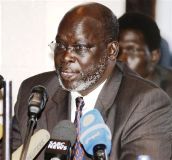Rebel leader says Sudan govt stalling for oil money
CAIRO, Oct 11 (Reuters) – South Sudanese rebel leader John Garang said the Khartoum government was dragging its feet in peace talks because it did not want to share oil revenues with the south at a time when oil prices are high.
 In an interview with the Arabic television news channel Al Jazeera, broadcast on Monday, Garang said the government’s attitude could lead to the disintegration of Sudan, the largest country in Africa and one of the most diverse.
In an interview with the Arabic television news channel Al Jazeera, broadcast on Monday, Garang said the government’s attitude could lead to the disintegration of Sudan, the largest country in Africa and one of the most diverse.
The government and Garang’s Sudan People’s Liberation Movement (SPLM) resumed peace talks in Kenya on Thursday amid fears that a failure to agree, coupled with the separate conflict in western Darfur, could lead to chaos in Sudan.
The government has said it would like to complete the southern peace deal by December but the SPLM had said it thought they could tie up loose ends in a matter of weeks.
Garang noted that under a wealth-sharing agreement reached earlier in the negotiations, the government would have to share oil revenues 50-50 with the regional government in the south from the day that they sign a peace deal.
Sudan produces more than 300,000 barrels of oil a day from fields mostly in the south and exports about 200,000 barrels per day – a major source of revenue to the government.
“This is where human nature comes in. They say if we signed an agreement today, then they would will give us 50 percent of the oil resources,” he added.
“For this reason, they are dragging their feet and they are calculating how to wriggle out of the agreement, and this is very dangerous,” he added.
Garang, who has led the southern rebellion for more than 20 years, was speaking in English and Al Jazeera broadcast an Arabic translation over his words.
“This could lead to the possible disintegration of Sudan, not because of obstacles or foreign intervention, but from bad management on the part of us Sudanese,” Garang said.
The rebel leader said the solution was to form a government of national unity as soon as possible so that Sudanese from all regions of the country have a stake in peace.
Under the framework peace agreement, the SPLM would join the central government when a deal is complete.
The military wing of the SPLM took up arms against Khartoum in 1983 demanding greater autonomy for the mainly animist and Christian south from the Arab and Muslim dominated government.
Some two million people have died in the conflict through fighting, hunger and disease.
